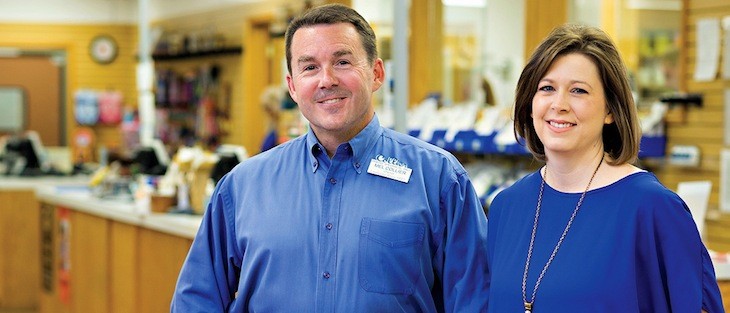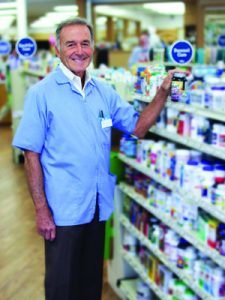Fayetteville drug store celebrates longevity in pharmacy biz
by July 10, 2017 5:06 pm 1,805 views

Collier Drug Store owner Mel Collier, left, and CEO Marci Gies lead the Fayetteville-based pharmacy chain during its centennial year.
Like any other town, Fayetteville has a strong sense of pride about its history. After being granted statehood in 1836, Arkansas’ first elected Congressman was from Fayetteville, Archibald Yell.
In 1852, Arkansas College, located where the First Christian Church now stands at 220 N. College Ave., became the first degree-granting college in the state. The Fayetteville School District was the first public school district organized in the state in 1868. The University of Arkansas, then known as the Arkansas Industrial University, was founded three years later as the first state university.
There are several historic landmarks and buildings throughout the city, also dating back to the 1800s. The UA campus alone is home to three buildings included on the National Register of Historic Places.
And at the eastern end of Dickson Street, there is another landmark that is still thriving as a hub of the community — Collier Drug Stores Inc., which is recognizing its 100th birthday this year.
The company has been at its flagship store since 1950 but traces its roots to the downtown Fayetteville square in 1917. In the century that’s followed, the Collier family has become a four-generation staple of healthcare in Northwest Arkansas.
“When your name’s out front, there’s a lot of pride involved,” Carl Collier said. “Whatever made us what we are, we’re going to continue to the best of our ability.”
The pharmacy chain is staying busy during its centennial year, externally and internally. In June, the company made a calculated move to enter one of the fastest-growing markets in the region, paying $1 million to acquire Talley Pharmacy in Centerton from its owner, Larry Talley, who retired. The acquisition gave Collier 90 employees, 19 pharmacists and a store footprint covering 10 stores, joining others in Fayetteville (2), Springdale (2), Johnson, Prairie Grove, Farmington, Bentonville and Elkins. A fleet of 15 vehicles provides what is arguably the company’s biggest point of pride — free delivery, which accounts for about 25% of the business.
In May, longtime employee Marci Gies was promoted to the company’s CEO. The organizational move will allow Mel Collier, Carl’s son, who has been sole owner of the business for the last decade, to take a step back from the day-to-day operations and devote more time to another business he acquired two years ago, University Auto & Tire Inc., at 614 N. College Ave.
“Marci has been doing the job of a CEO for several years, so we just made it official,” he said. “I am still here from time to time, but I’m spending more and more time down at the auto shop.”

Gies grew up working as a delivery driver/cashier for her hometown pharmacy (Thomas Lakeside Pharmacy) in Bull Shoals, and joined Collier Drug Stores in 1994 as a pharmacy technician. She is the first non-family member to hold a leadership role in the company’s 100 years.
“The thing is, though, I feel like I’m not outside the family,” she said. “Ever since I’ve started working here, people would always ask me if I was a Collier. I feel like Mel is my brother.”
Gies assumes her executive role as the company is expected to top $28 million in revenue this year. For perspective, annual sales were $24.7 million in 2014, $25.9 million in 2015 and $27.4 million in 2016. Collier Drug Stores is now the largest privately-owned drug store chain in Northwest Arkansas, and one of the most respected in the state.
“Mel and Carl have grown a family business into a regional powerhouse while maintaining the family-owned feeling that patients first fell in love with 100 years ago,” said Scott Pace, executive vice president and CEO of the Arkansas Pharmacists Association. “They were invested, and they are still invested in the people of Northwest Arkansas and their health.”
‘ABOVE AND BEYOND’
That family-owned feeling, Gies said, isn’t a bunch of hooey, either.
“I like to think we’re doing things the right way, but I also think a lot of our success is our employees and the service they provide to our customers,” she said. “It’s not the typical service you’re going to find at other pharmacies. We feel like it’s above and beyond.”
The Collier family has been going above and beyond since 1917 when M.M. Collier, Mel’s great-grandfather, started the pharmacy business by opening the Red Cross Drug Store on the north side of the Fayetteville square. The business eventually evolved to include the second generation of leadership, Morris Collier, M.M.’s son.
By the late 1940s, the drug store was still enjoying success, but there was one thing that was a looming threat, an issue that’s still much-discussed today — lack of downtown parking.
Carl Collier recalled the decision was risky to leave the square for Dickson Street. He gave most of the credit for making it happen to his mother, Isabella Collier, and to another of Fayetteville’s multi-generational companies, The McIlroy Bank. Now defunct — it was sold in 1986 to Jim Walton’s Arvest Bank Group — it was the oldest bank in Arkansas, founded in 1871, the same year as the UA.
“Mother was a very good businesswoman and was the impetus for us coming to Dickson Street,” Carl said. “She was willing to sign those big bank loans that it took to get off the square, where there was no parking. Mom’s encouraging of Dad was important. She didn’t want to stay on the square where they’d be choked out. The parking lot at the new building was a stabilizing factor in the business.
“One or two of the banks did not want to invest in dad going to Dickson Street. They thought if you got off the square, it was the end of the business. Hayden McIlroy Sr. said to him, ‘Morris, you’ll be halfway between the square and the [UA], and you’re going to have a big parking lot.’ He said, ‘Let’s go.’ It was Hayden Sr. that backed dad to build a new store, and it was instant gold.”
With the second store came the birth of the name Collier Drug Store. The family continued to operate both pharmacies until 1955 when the Red Cross Drug Store was destroyed by a fire. The Dickson Street location later doubled in size in 1960 when the store was expanded north into a building that was previously home to a lumber yard. The store took on its current footprint of 15,000 square feet in 1966.
THE FAMILY BUSINESS
Carl Melvin Collier and Carl Melvin (Mel) Collier Jr. each started working for the family business when they were 9 years old — Carl as a soda jerk, Mel cleaning and stocking shelves.
“I had a brother and sister, and that was just part of growing up,” Carl said. “It was kind of like the family farm. After school, whenever, all us kids were at the drug store.”
Carl graduated with a bachelor’s degree in pharmacy from the University of Arkansas for Medical Sciences in 1964 and joined his brother Morris and his father in the family business. He took over as head of the company in 1971, and in 1994, Mel joined the company full time, following graduation from the UA with a management degree. He became operations manager in 1998, but his was not a prearranged path.
“Growing up, dad said I could do whatever I wanted; there was no pressure [to work for the family business],” Mel said. “When I came back, Dad wanted to be the face guy, talking to customers. He never really liked the business part, and that’s what I enjoy doing. I was a numbers guy. I handled the behind-the-scenes work. … Looking back, I didn’t understand everything, but growing up in the business, I understood a lot.”
Carl, 75, has been semi-retired since Jan. 1, 2007, when Mel negotiated a buyout of multiple shareholders to become the sole owner.
“We’d meet every Tuesday. And we had some non-working family members [in the ownership], and they didn’t hesitate at being vocal at those meetings,” Carl recalled. “They weren’t working through the problems every day and essentially, Mel got tired of it. One Tuesday we were meeting at Powerhouse and Mel said, ‘Before we get started, let me tell you this. I’m either going to buy you out or you are going to buy me out.’ He’d already arranged financing with Mary Beth Brooks [at The Bank of Fayetteville], and I was 65. My wife [Janet] and I visited, and it didn’t take five minutes for us to agree. [Mel]’s 40 years old, if he’s ready, then let’s negotiate this out. And we worked it out in nothing flat. I became an employee of his and haven’t looked back. He is a good businessman. Very good.”
Carl stays involved in the business these days as a relief pharmacist, filling in when and where needed.
“I work a certain schedule, but if [an employee] has got a kid in a school play and they need to be there a couple of hours, I’m going to be there,” he said.
THE AGE OF ROBOTS
Staying on the forefront of technology helps a business grow, and Collier Drug Stores is no different.
The pharmacy was the first Kodak dealer in the state in 1947. When the Dickson Street store opened in 1950, it joined the state capitol in Little Rock as the only buildings in the state to have electric doors. In 1974, the company was the fourth pharmacy in the U.S. to begin using computerized record-keeping.
Last year, Mel Collier said the company filled nearly 400,000 prescriptions, and it would be nearly impossible to fill them all by hand. The company introduced robots to the pharmacy in 2001. Three ScriptPro robots work behind the scenes at three of the company’s busiest stores (Dickson Street, Har-Ber Meadows in Springdale and Prairie Grove) sorting through more than 100 medications (they don’t handle liquids or creams, only pills) to count, pour, label and package for pharmacists to administer.
Overseeing the tech division from its infancy is the company’s longest-serving employee (other than Carl Collier). Chief Information Officer Curtis Cumbie started with the business as a delivery driver in 1980, worked his way up to a merchandising role a few years later, then adding the hat of “IT Guy” in 1990, when the company switched from mainframe to PC-based computing. Today the business has 116 PCs and 13 servers.
Mel Collier said the company is constantly seeking out new technology. For the immediate future, he and Gies both agree the business won’t have a role in another emerging horizon for the pharmacy industry — medical marijuana. Arkansas voters legalized the drug last November, clearing its use by people with certain medical conditions.
“There was a law passed requiring dispensaries to hire pharmacy consultants, but our pharmacists will not do that,” Gies said. “Probably best to keep that separate.”
